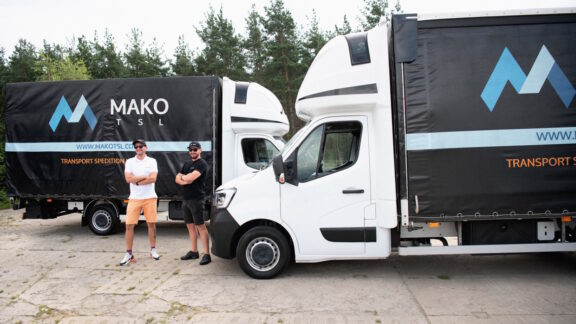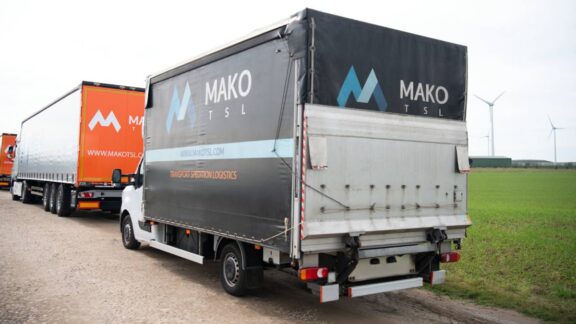The road transport market, both in Poland and globally, is undergoing dynamic changes in the second half of 2024 due to global megatrends, regulatory changes, and increasing social and environmental expectations. Both economic factors and the development of new technologies are shaping the industry. As an active participant in the TSL (Transport, Shipping, Logistics) industry, we closely monitor these changes and adapt accordingly. We must constantly improve our competitiveness and operational efficiency to maintain our leadership position. Below are the key trends dominating the road transport market in the second half of 2024.
Automation and digitization of logistics processes
Automation of transport processes and the digitization of logistics play an increasingly important role in improving the operational efficiency of transport companies. In 2024, there has been a noticeable increase in investment in Transport Management Systems (TMS) and telematics, which help monitor fleet conditions, plan routes in real-time, and minimize downtime. Technologies such as artificial intelligence (AI), the Internet of Things (IoT), and Big Data enable even greater optimization of transport processes. For example, advanced analytics systems are used to forecast demand and manage supply chains more flexibly and efficiently. At MAKO TSL, we invest in maintaining our digital infrastructure at the highest level, providing our specialists with tools tailored to their needs and meeting the demands of the modern transport market. These tools are available not only to dispatchers and office workers but also to drivers, significantly reducing the time spent on formalities. Autonomous solutions are increasingly being implemented, though full automation of road transport is still some way off. In 2024, autonomous trucks are being tested on certain routes, especially in the U.S., signaling a gradual shift towards more automated transport models in the future.
Labor shortages and the growing importance of drivers
One of the challenges the transport industry continues to face is labor shortages, particularly among drivers. This issue is intensifying in the second half of 2024, prompting companies to invest in better working conditions, training, and technologies that can ease the burden on employees. Driver wages are also rising, and employers must compete for workers by offering better benefits and greater work flexibility. At the same time, the shortage of personnel is driving transport companies to increasingly turn to automation to reduce their reliance on drivers. However, in the short term, more innovative forms of work, such as fleet-sharing and efficient management of driver working hours, may be solutions.
Globalization and increasing uncertainty in international markets
The global road transport market does not operate in isolation from global events. In 2024, the transport industry is still affected by the consequences of the war in Ukraine, geopolitical tensions, and fluctuations in oil and fuel prices. This all leads to rising operating costs, which are passed on to consumers. In this situation, transport companies must seek cost savings by investing in modern technologies and more efficient management strategies. Despite the slow growth in global market stability, there is increasing talk of another downturn in the global economy. The PMI production index in Germany, Europe’s largest economy, remains in negative territory, signaling further declines in transport orders in the second half of 2024. As a result, we are seeing an increasing exit of smaller and poorly managed transport companies from the market. In addition, global supply chains remain vulnerable to disruptions, forcing transport companies to be more flexible in route planning and faster in responding to market changes. International cooperation and partnerships, which allow for cost optimization and increased operational security, are becoming increasingly important.
Regulations and safety standards
The second half of 2024 also brings significant regulatory changes regarding road transport safety. Both nationally and at the European level, new regulations are being introduced regarding emission standards as well as more stringent requirements for vehicle and driver safety. Companies must adapt their fleets to the new standards, which involves investing in vehicle modernization and staff training. One of the most pressing issues in this regard is the mandatory introduction of second-generation smart tachographs. This is part of the EU Mobility Package, which aims to harmonize the internal EU transport market and increase safety. The new tachographs will automatically record the crossing of a country’s border and be resistant to data manipulation. By the end of 2024, all trucks over 3.5 tons registered before June 15, 2019, must replace their tachographs with “smart” ones. Another element aimed at increasing road safety is the requirement to install so-called “black boxes,” or Event Data Recorders (EDR), in vehicles. For vehicles up to 3.5 tons, this requirement already applies to all new cars. In heavy transport, it will take effect from January 2026. This is not the only new mandatory equipment in new trucks. As of July 2024, under the EU’s General Safety Regulations package, which aims to reduce the number of fatalities in road accidents, the mandatory equipment list for new trucks includes: start information systems (MOIS), blind spot sensors (BSIS), rear information systems (REIS), speed limit warnings (ISA), driver fatigue warnings (DDWA), tire pressure monitoring systems (TPSM), and mounts for alcohol interlock devices. Significant emphasis is also placed on cybersecurity, especially in the context of the increasing digitization and automation of the industry. Modern transport management systems and autonomous vehicles require advanced security measures to protect against potential cyberattacks that could paralyze business operations.
Green transformation and decarbonization
Green transformation is one of the most significant challenges facing the transport industry in 2024. Growing pressure from consumers, investors, and governments to reduce carbon emissions is accelerating the implementation of eco-friendly solutions. In particular, the European Union’s policies, including the European Green Deal, are pushing transport companies to invest in green technologies such as electric vehicles, hydrogen propulsion, and more efficient fleet management systems. In a revision of the regulations in May 2024, the European Council maintained the goal of a 15% reduction in emissions by 2025 for trucks weighing over 16 tons. However, the 2030 reduction target was increased from 30% to 45%. This will apply not only to heavy trucks but also to vehicles over 7.5 tons and coaches, as well as to relevant specialist vehicles starting in 2035. Due to legal changes implemented by the European Union, electric trucks and those powered by alternative fuels, such as biogas, are becoming increasingly popular. Companies are investing in charging infrastructure as well as driver training in eco-friendly driving, which helps reduce fuel consumption and emissions.
The second half of 2024 is a period full of challenges and changes for the road transport industry
Green transformation, digitization, automation, and regulations are impacting how transport companies operate, forcing them to adapt to new realities. On one hand, technological development offers new opportunities for process optimization and cost reduction. On the other, global changes and labor shortages present numerous challenges for businesses. Companies that successfully adapt to these trends will gain a competitive advantage and be better positioned to meet the needs of their customers in an ever-changing environment.



